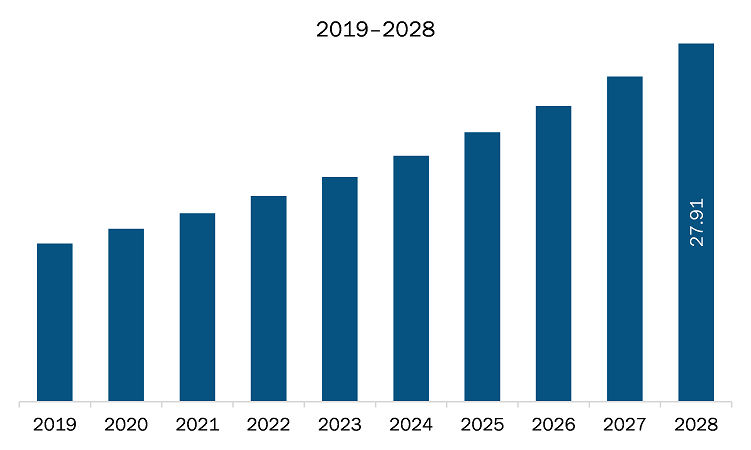The leukapheresis market in Asia Pacific is expected to grow from US$ 14.69 million in 2021 to US$ 27.91 million by 2028; it is estimated to grow at a CAGR of 9.6% from 2021 to 2028.
The incidence of blood-related disorders is rising in developing countries due to the shift in lifestyle owing to the adoption of modern facilities. The modernization of facilities has led to reduction in physical activities of people, unlike stress levels, which are increasing due to various professional and personal factors. Developing countries are significantly focusing on the advancement of their healthcare facilities. For example, Hemophilia Federation India (HFI) is a nonprofit organization that has worked closely with the World Federation of Hemophilia (WFH) to spread awareness and educate people regarding affordable treatments available for hemophilia, thereby improving diagnosis and therapy. Thus, the abovementioned factors are providing opportunities for the growth of the leukapheresis market.Countries in the Asia Pacific are facing challenges due to increasing incidences of COVID-19. The COVID-19 pandemic has put a major strain on the health systems of many countries around the world. The cases of COVID-19 in India, the pandemic caused by SARS-CoV-2, has reached to 10,582,647 and total deaths above 152,000 on January 19, 2021. There is currently no proven specific therapy, and multiple novel and repurposed molecules are being used on an experimental basis. The lack of effective therapeutic options has been a major hurdle in our pandemic mitigation measures. There are a few contender medicines including the malaria drug hydroxychloroquine, an antiviral Remdesivir, and Ivermectin, a drug used for worms and other parasites, but the results are not hugely encouraging and at times conflicting. In this backdrop, plasma therapy is being seen with interest as a cure for COVID-19 patients in India. Further, Medical equipment that carries out the apheresis procedure was installed at the GMCH at nearby Thrissur last month and the technique was used for the first time in Kerala to administer plasma to a 51-year old man. The apheresis procedure was carried out by GMC's technologists working with the departments of medicine, transfusion medicine and anesthesia.
With the new features and technologies, vendors can attract new customers and expand their footprints in emerging markets. This factor is likely to drive the Asia Pacific leukapheresis market. The Asia Pacific leukapheresis market is expected to grow at a good CAGR during the forecast period.

- This FREE sample will include data analysis, ranging from market trends to estimates and forecasts.
Asia Pacific Leukapheresis Market Segmentation
Asia Pacific Leukapheresis Market – By Product Type
- Leukapheresis Disposables
- Leukapheresis Devices
Asia Pacific Leukapheresis Market – By Application
- Research Applications
- Therapeutic Applications
Asia Pacific Leukapheresis Market – By Product Type
- Blood Component Providers and Blood Centers
- Hospitals and Transfusion Centers
- Pharmaceutical and Biotechnology Companies
- Academic and Research Institutes
Asia Pacific Leukapheresis Market – By Country
- China
- Japan
- India
- South Korea
- Australia
- Rest of APAC
- Canada
- Mexico
Asia Pacific Leukapheresis Market – Companies Mentioned
- Asahi Kasei Corporation
- Fresenius SE & Co. KGaA
- Haemonetics Corporation
- Terumo Corporation
- STEMCELL Technologies Inc.
- HemaCare
- Macopharma
- AllCells
- STEMEXPRESS
- BioIVT
Asia Pacific Leukapheresis Report Scope
| Report Attribute | Details |
|---|---|
| Market size in 2021 | US$ 14.69 Million |
| Market Size by 2028 | US$ 27.91 Million |
| CAGR (2021 - 2028) | 9.6% |
| Historical Data | 2019-2020 |
| Forecast period | 2022-2028 |
| Segments Covered |
By Product Type
|
| Regions and Countries Covered |
Asia-Pacific
|
| Market leaders and key company profiles |
|
- Historical Analysis (2 Years), Base Year, Forecast (7 Years) with CAGR
- PEST and SWOT Analysis
- Market Size Value / Volume - Regional, Country
- Industry and Competitive Landscape
- Excel Dataset
Recent Reports
Testimonials
Reason to Buy
- Informed Decision-Making
- Understanding Market Dynamics
- Competitive Analysis
- Identifying Emerging Markets
- Customer Insights
- Market Forecasts
- Risk Mitigation
- Boosting Operational Efficiency
- Strategic Planning
- Investment Justification
- Tracking Industry Innovations
- Aligning with Regulatory Trends






















 Get Free Sample For
Get Free Sample For